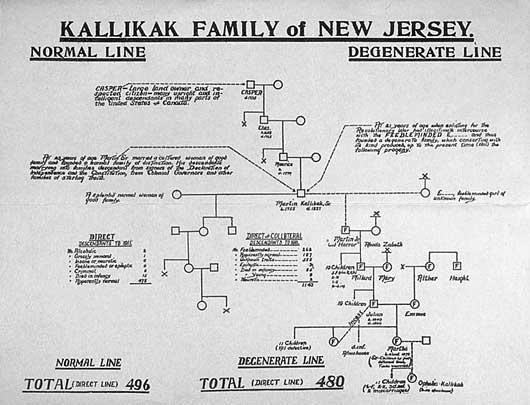Also, I read an article here about the findings of Henry H. Goddard's research on intelligence based on the Kallikak Family Study. He was an American psychologist who believed that the lack of intelligence resulted from a single recessive gene. He focused his studies on "morons," those who he claimed to act like a normal person but has low intelligence hidden deep down inside. In his study, he believed that there were two lines to the Kallikak family in which one resulted in children with the intelligence to lead a successful life and the other led to children who did not have the intelligence to make the right decisions in life and in society. The good line resulted from the marriage of Martin Kallikak, Sr. and a Qucker woman, whereas the bad line began with the affair of Martin Kallikak, Sr. and a tavern girl. In a nutshell, he believed that the genetic traits from the tavern girl is passed down onto the next generation, resulting in low intelligence in her children. More details of the Kallikak Family Study can be found in Goddard's published book, The Kallikak Family: A Study In The Heredity Of Feeble-Mindedness.
Monday, April 4, 2016
Intelligence
I took an online IQ test recently and was pretty surprised about my results. With simply questions about patterns and logic of all difficulties, my supposed intelligence was determined. In a way, I was just shocked that a set of questions can determine the powers of a human brain to such an extent. Nonetheless, I believe the test was mostly accurate because while I was taking the test, I was concentrated to answer every question in a quiet classroom even though my drowsiness began to kick in near the end. I had done better than expected on the test as I was beginning to doubt my academic abilities in school with some discouraging situations throughout the year. Perhaps if I work harder, I may be able to survive high school.
Subscribe to:
Post Comments (Atom)

No comments:
Post a Comment